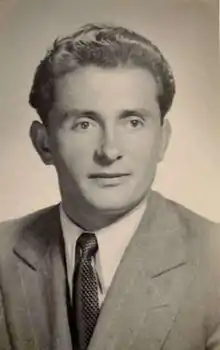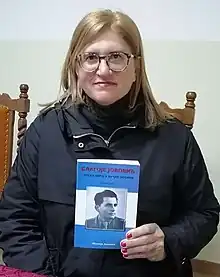Blagoje Jovović
Blagoje Jovović (Serbian Cyrillic: Благоје Јововић; 1922 – 2 June 1999) was a Montenegrin Serb soldier, and participant of World War II in Yugoslavia initially as a member of the Partisan and later the Chetnik movement. He attempted to assassinate Croatian Ustaše leader Poglavnik Ante Pavelić in Argentina.
Blagoje Jovović | |
|---|---|
 Blagoje Jovović | |
| Born | 1922 |
| Died | 2 June 1999 (aged 76–77) |
| Occupation(s) | Military officer, hotel owner |
| Known for | attempted assassination of Poglavnik Ante Pavelić |
Biography
Jovović was born in Kosić near Danilovgrad in today's Montenegro.[1] During World War II, he initially fought for the Yugoslav Partisans and then the Chetniks,[2] as a member of the Bjelopavlić Chetnik brigade.[3] At the time when World War II started, he was serving in Strumica, near the Yugoslav border with Greece. When war broke out, Jovović reportedly came back to his birthplace, Kosić in Bjelopavlići.[4] In July 1941, he took part in an antifascist uprising against Italy and later participated in the battle of Pljevlja as a member of the Partisans.[4] He later switched allegiances and fought for the Chetniks,[5] under the command of Bajo Stanišić. In September 1944, he was part of the delegation led by Dušan Vlahović and Jakov Jovović, that was sent from Kotor across the Adriatic Sea to Taranto to negotiate with the British.[6] There they were informed about the Allied change of support in favour of Tito's Partisans as a result of the Tehran Conference and they stayed in Italy until the remainder of the war.[6] Jovović spent his time in Italy in several refugee camps. For a brief period, he worked in the Secret Intelligence Service of Britain. On one such occasion, he met Randolph Churchill, of whom he reportedly did not hold a very high opinion.[7] In 1948, Jovović emigrated to Argentina with the help of Jakov Jovović, a naval officer of the Kingdom of Yugoslavia.[4]
Attempted assassination of Ante Pavelić
In Argentina, Jovović was known as the founder of the Serbian Orthodox community “Saint Sava”, and one of the founders of the Organisation of Fighters “Draža Mihailović” as well as the member of the Board of the “Njegoš” association.[8] While living in Argentina and running a successful hotel enterprise that he owned, he received tips about Pavelić's whereabouts in Argentina. In the assassination attempt, Jovović received assistance from several people including Jakov Jovović and Milo Krivokapić, an associate of Blagoje.[4]
The assassination was scheduled to take place on 9 April 1957, on the eve of the Independent State of Croatia's anniversary celebration, but they decided to delay the attack by a day.[7] On 10 April at 21:00, 16 years after the founding of the Independent State of Croatia, Pavelić suspected someone was following him as he walked down a street, so he turned back and fired several shots towards Jovović, who started running after Pavelić and fired five shots, two of which hit Pavelić who then, according to Jovović, staggered, bent and begged for mercy.[7] There are however, differing versions of how the attempted assassination unfolded.[4]
Jovović described the assassination attempt in the following excerpt from the book Two Bullets for Pavelić („Два метка за Павелића”) by Tihomir-Tiho Burzanović:[7]
I went after him, walking fast, nearly running. I got close, I was seven or eight meters from him. Pavelić sensed my presence, turned around and started shouting, 'Fuck your Serbian-Jewish communist mother!' I heard a shot, but couldn't see where it had come from. I didn't stop. I kept running straight towards him. Once I was two to three meters away from him, I started shooting. Once. Twice. I shot him in the back, as he was running away. Two bullets hit him and he fell. He dropped his briefcase and lay motionless. I was cautious. He might have been pretending to be dead. I started thinking that maybe it would be best to keep him alive and make him face a trial. I thought about beating him. Then I looked at his briefcase and thought of taking his documents. But, I thought, if there is any money in there and I get caught, I'd be labelled a thief and it may appear as if I had killed him just for the money. I decided to leave him and his briefcase as they were. Someone started shouting and shooting in my direction. I turned around and took three shots and started to run around the buildings on a semicircular street. Some people stepped out and asked me what had happened. Breathless, I responded, 'Look at those drunk fools, they're shooting at people for no reason!' I hid the gun in my pocket. I left one bullet for myself, just in case.
Pavelić required hospitalization following the attempt. As he recovered, the government of Argentina reached an agreement with Yugoslavia to extradite Pavelić.[9] As a result, he fled to Chile before landing in Francisco Franco's Spain.[9] He died on 28 December 1959 in Madrid, Francoist Spain from complications as a result of the wounds.[9][10]
By Jovović's own account, he acted on his own, independent of the Yugoslav or any other secret services.[2] Most Croat émigrés believed that the Yugoslav state was behind the assassination attempt.[11] Jovović stated that he wanted to kill Pavelić in order to "avenge Serbian victims" from the "greatest butcher of Serbs".[2]
Final years and legacy

In 1999, Jovović visited Yugoslavia for the first time since he left and visited Ostrog, where he met Metropolitan Amfilohije. It was there that he first publicly confessed that he was the person responsible for the attempted assassination of Ante Pavelić.[3] Jovović died on 2 June 1999 in Rosario, Argentina.[12]
Memorials

In 2020, a street in Belgrade was renamed after Blagoje Jovović. A memorial plaque was also installed.[13]
References
- de Oca, Ignacio Montes (2013). Ustashas: El ejército nazi de Perón y el Vaticano. Penguin Random House. p. 159. ISBN 978-9-50074-520-8.
- Tokić, Mate Nikola (2020). Croatian Radical Separatism and Diaspora Terrorism During the Cold War. Purdue University Press. pp. 92–93. ISBN 978-1-55753-892-5.
- "Belgrade honours Montenegrin Chetnic for trying to kill head of Croatian Ustashi". N1 Belgrade. 30 July 2020.
- Kostić, Stefan (31 January 2020). "Blagoje Jovović, čovek koji je upucao Antu Pavelića" [Blagoje Jovović, the man who shot Ante Pavelić]. Radio Television of Serbia.
- Zlatar, Pero (9 March 2009). "The Secret of the Assassination of Ante Pavelic". dalje.com. dalje.com. Archived from the original on 2014-06-24. Retrieved 24 June 2014.
- Zlojutro, Darko (10 April 2019). "ANTE JE NALETEO NA ČETNIKA BLAGOJA, ČUO SE PUCANJ I PAVELIĆ JE PAO! Ustaški zlikovac smrtno je ranjen na dan NDH!". espreso.rs.
- Burzanović, Tiho-Tihomir (1998). Dva metka za Pavelica. Kulturni centar Sveti Sava.
- Lopušina, Marko (8 August 2020). "Ko su argentinski Srbi". Radio Television of Serbia.
- Zander, Patrick G. (2020). Fascism through History: Culture, Ideology, and Daily Life [2 volumes]. ABC-CLIO. p. 362. ISBN 978-1-44086-194-9.
- Fischer, Bernd Jürgen (2007). Balkan Strongmen: Dictators and Authoritarian Rulers of South Eastern Europe. Purdue University Press. p. 211. ISBN 978-1-55753-455-2.
- Nielsen, Christian Axboe (2020). Yugoslavia and Political Assassinations: The History and Legacy of Tito’s Campaign Against the Emigrés. Bloomsbury Publishing. p. 286. ISBN 978-1-78831-686-6.
- "Blagoje Jovović dobija ulicu u Beogradu, a Đuza Stojiljković spomen-ploču". Danas.rs. 24 December 2019.
- "Memorial plaque unveiled, street named in Belgrade after Ante Pavelic's assassin Blagoje Jovovic". telegraf.rs. 5 August 2020.